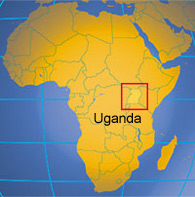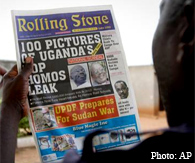First tabled by Ugandan lawmaker David Bahati in October 2009, the controversial bill sparked outrage and protests around the world when it made the headlines. The original bill sought a death sentence for active homosexuals living with HIV while anyone convicted of a homosexual act would face life imprisonment. The bill also went as far as to mandate a jail term of up to seven years for anyone including family members, friends and even landlords if they are found to have knowledge or have aided, abetted, counseled anyone who is known to be a gay man or lesbian. The bill was thought to have been "shelved" by Uganda's president Yoweri Museveni following an international outcry but is reportedly back in parliament this week.



According to an Associated Press report on Monday, the bill's author, Bahati, was quoted as saying that they "have moved away from" the death penalty provision in the bill which is now undergoing debate and negotiations and a new version would likely be presented before a final vote is held.
The International Gay and Lesbian Human Rights Commission issued a statement on May 6 that they are "shocked" at possible passage of the bill.
"We are shocked that after more than 2 years of engagement with the government of Uganda about the Anti-Homosexuality Bill, this heinous piece of legislation may still become law," said Cary Alan Johnson, IGLHRC Executive Director. "Governments, world religious and political leaders, and HIV prevention experts have all appealed to Ugandan parliamentarians to put their distaste and fear of LGBT people aside and use their better judgment for the good of the country."
The Kampala-based Civil Society Coalition on Human Rights and Constitution Law has also issued a statement on May 9 calling unanimously for the "complete withdrawal of the anti- homosexuality bill, whether in its original or amended form."
The following is a press statement issued by Uganda's Civil Society Coalition on Human Rights and Constitutional Law on May 9, 2011:
Is Uganda’s 'Kill The Gays' bill being used to blind the world?
Just days after opposition leader Colonel Kizza Besigye was deliberately blinded with pepper spray while on his way to work, the internationally reviled Anti-Homosexuality Bill was brought back to Parliament for public hearings in preparation for the second reading. Speculation is rife that the Bill, once believed to have been permanently shelved by Cabinet in light of its many absurdities, is being used to blind the world to everything else that is going on in Uganda right now. Alternatively that re-opening the discussion about a backwards looking and harmful proposal is symptomatic of a more general problem of weak governance.
Whatever the case may be, Uganda is struggling to come to terms with rampant inflation, teargas and mass arrests on an unprecedented scale: As civil society protests the draconian crack-down on protesters and opposition, it is clear that if the hate-filled Kill the Gays Bill is passed, it will finish the process of burying alive not just the sexual minorities of Uganda, but also all those who support the principles of constitutionalism, human rights for all, inclusivity, and democratic governance.
The essence of our submission to the Legal & Parliamentary Affairs Committee of the Ugandan Parliament, as made on Monday 9th May 2011, is therefore as follows:
From a LEGAL PERSPECTIVE, the Anti-Homosexuality Bill is:
1) Unconstitutional because it violates the rights to privacy, freedom from discrimination, equal protection for all, and protection of minorities. These rights as they relate to sexual minorities have already been established in Uganda’s High Court in the cases of Victor Mukasa & Another vs. Attorney General (High Court Miscellaneous Cause No 24 of 2006), and Kasha Jacqueline, Pepe Onziema & David Kato v. Giles Muhame and The Rolling Stone Publications Ltd. (2011)
Six of the eighteen substantive provisions of the Anti Homosexuality Bill 2009 are UNCONSTITUTIONAL. This implies that parliament can only pass them after amending the constitution.
2) Disproportionate because it elevates the crimes provided for to the same levels as those of terrorism, treason and misprision of treason. The Bill therefore proposes that consensual sex between adults is as dangerous to the people of Uganda as the placing of a bomb in a crowded nightspot!
3) Redundant because it replicates existing provisions. Most importantly:
- Homosexuality is already criminalised under the ‘unnatural offences’ provisions of Section 145 of the Penal Code Act of Uganda Cap 120.
- Sex with children under the age of 18, whether girls or boys, is already criminalised under the 2007 amendment to the Penal Code Act
The new provisions of the Bill if passed into law would be are largely incapable of implementation. Most importantly:
- Attempts to commit homosexuality
- Detention with intent to commit homosexuality and
- Failure to disclose the offence
Twelve of the eighteen substantive provisions are REDUNDANT. This is because they either replicate existing law or they are incapable of being practically implemented. In essence, this makes the whole bill a waste of time, for without a constitutional Amendment, it would be useless to pass a Bill whose provisions are either unconstitutional or redundant.
From a MEDICAL PERSPECTIVE the Bill is based on false science, myths and discredited theories with regard to:
- Sexuality, sexual orientation and homosexuality
- The possibility of changing sexual orientation
If adopted, the Bill would force Medical professionals to inform on their homosexual clients, thereby breaking the two most fundamental tenets of their profession, namely the Hippocratic Oath and the commitment to total client confidentiality.
From a PUBLIC HEALTH PERSPECTIVE the Bill, if passed into law, would be a direct attack on Uganda’s already weak efforts to combat HIV/AIDS, as it would criminalise outreach, education and information at a time when new infections are on the rise and more people need to be placed on ARV treatment. It is generally understood that stigmatisation of vulnerable and at-risk groups is one of the biggest obstacles to HIV prevention; this Bill simply worsens the stigma and makes it impossible for health workers to do their jobs. The Bill, if passed into law, will thus become a further hindrance to Uganda’s attainment of the Millenium Development Goals. From a mental health perspective, the Bill is bound to produce an increase in depression and suicides by persons who feel they have no choice but to suppress their sexuality.
From a GOVERNANCE PERSPECTIVE the Bill is repugnant in that it criminalises a range of civil society activities, and thereby circumscribes their capacity to intervene effectively. It undermines civil society’s freedom of expression through banning the ‘promotion’ of sexual health and sexual rights
messages. It also asserts a single model of family rather than recognising the diversity of traditional and modern structures already existent in Uganda. As such it stifles the majority of Uganda’s heterosexual citizens, alongside their homosexual brothers and sisters.
From a POLITICAL PERSPECTIVE the Kill the Gays Bill, and the wider homophobic discourse which it is derived from, and which it seeks to exacerbate, is being used to divert the attention of ordinary Ugandans from more immediately pressing issues.
CAN THE BILL BE AMENDED?
The Coalition has been reliably informed that attempts have been made to find a ‘win win situation’ which protects both National and International interests by amending those portions of the Bill which are most offensive to international best practice. We also hear that Honorable Bahati, has proposed a number of amendments to his original Bill.
As a Coalition we do not believe that there is any conflict between national and international perspectives on the failings of the original Bill, nor do we believe that amendments in any way offer an acceptable way forward; while the wording may change, the intention of an Anti-Homosexuality Bill will remain the same: to Kill the Gays. We therefore reject the original Bill, together with any attempts to amend it, in their entirety.
HAS THE PROCESS BEEN SUFFICIENTLY TRANSPARENT?
We also protest the manner in which, since the tabling of the Bill in 2009, attempts have been made to exclude the voices of civil society actors from the debates about the Anti-Homosexuality Bill. Laws, unlike sex between consenting adults, should be done in public, not behind closed doors. We therefore thank the Legal & Parliamentary Affairs Committee for hearing our submissions on Monday 9th May 2011.
POSITION AND RECOMMENDATIONS ON THE WAY FORWARD
1. We call unanimously for the complete withdrawal of the Anti-Homosexuality Bill, whether in its original or amended form
2. We urge the incoming Parliament to pursue urgent legal reform to introduce clear legal recognition of the distinction between consensual and non-consensual sex between adults, whatever their gender. Specifically:
- The existing definition of rape must be modified to recognise male victims for purposes of comprehensively criminalising non-consensual sex
- The Penal Code must be amended in order to decriminalise consensual same-sex relations.
3. We call for a broader, more informed and ongoing dialogue on sexual health and sexual rights, between a broad range of stakeholders, including but not limited to: Government, religious leaders, traditional leaders, human rights activists, feminists, journalists, public health workers, sexual majorities and minorities, to minimise the manipulation of sexuality for political purposes, and to maximise human rights, public health and good governance for all.











 Printable Version
Printable Version










Reader's Comments
- From a LEGAL PERSPECTIVE, the Anti-Homosexuality Bill is:
- HAS THE PROCESS BEEN SUFFICIENTLY TRANSPARENT?
- POSITION AND RECOMMENDATIONS ON THE WAY FORWARD
All this pussy-footing around and rational talk with these people is bullshit and a waste of time. Step on them and step on them hard.
Great Britain takes pride in thinking of itself as a tolerant country. Indeed, it was, arguably, one of the first countries in the so-called civilised world to legalise homosexuality.
However, as recently as 1952, its Parliament debated whether to impose the Death Penalty for homosexual acts.
In fact, arguably, one could submit the head, David B. to ICC for a possible violation of international customary norm, which is to respect the rights of privacy and right to non discrimination.
Such rules must be observed; even in the one of the developing countries, Cambodia has progressively made a bolder approach to allow such pride. Comparatively, political motives by this David B. is much influenced by his church teachings.
The battle is on. Stay still, the world will arrest those ignorant figures. Sign the petition, raise to Uganda ambassador and preach him over the meaning of "love".
So, I'm surprised to see this creeping back to the fore again? Perhaps the American fundamentalist preachers, who played active parts in whipping up anti-gay hysteria before, have grown bored of not being listened to, and have started again?
Who can say what will happen... it could all be a political game being played out by various factions within the Ugandan government, even though they would know very well that passing such a law would damage Uganda's interests. Let's see...
_______________
Now, as an aside, I saw: "However, as recently as 1952, [Britain's]Parliament debated whether to impose the Death Penality for homosexual acts."
I think I need to have a think about what 'recently' means, if it no longer means 'last week', or 'last month' (which is what it means in the newspapers I work on) and now means instead as 'recently' as... 60 years ago.
As recently as approximately 21,900 days ago, you say?! My goodness...
;-)
The whole thing is a diversion from other deadly goings on, and it's important to shine a light on it all.
Please log in to use this feature.